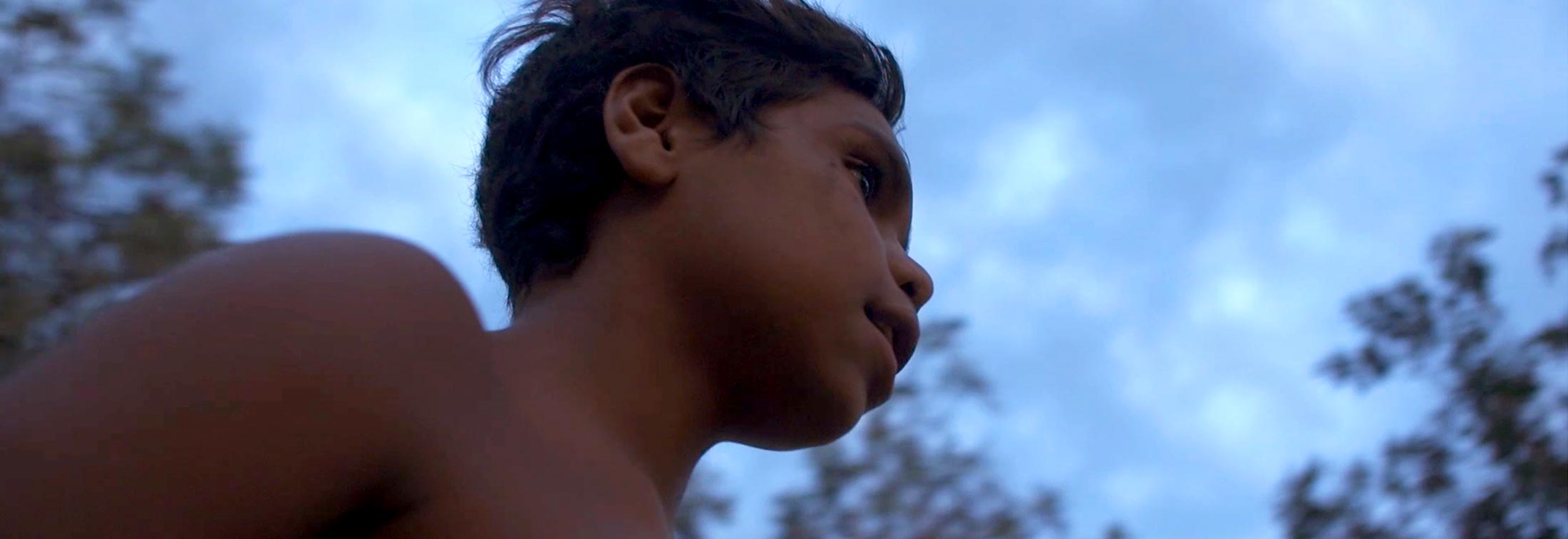

Dujuan Hoosan is a ten-year-old Indigenous child residing in Alice Springs, a cheeky kid full of life and personality. He is also a bit of a troublemaker, testing the patience of his (white) teachers and running amok, constantly sending his mother and grandmother on late-night searches to ensure he is safe. Dujuan, in his own words, just wants to "be free", engaged not by his classroom but by the stories and beliefs of his Aboriginal heritage, well on his way to becoming a spiritual healer for his people. Why then, the audience is made to wonder, doesn't Dujuan's brightness translate to his floundering school grades? 'In My Blood It Runs' presents Dujuan's story as a microcosm for the large scale issues currently affecting Australia's Indigenous youth, highlighting the manners in which the country's Western education ideals are leaving these children behind, not to mention the fact that most of them will likely end up in juvenile detention (100% of Alice Springs youth detainees were Indigenous at the time of filming). Simply put, the future looks bleak for Dujuan and other kids like him.
'IN MY BLOOD IT RUNS' TRAILER
The documentary excels in never sensationalising any aspect of Dujuan's story for dramatic effect; simply capturing Dujuan's daily life is enough to make blood boil and tears fall. It is particularly shocking to witness the major lack of understanding Dujuan's teachers possess about his heritage (at one point, the Dreamtime is brushed off by an elderly female teacher as silly superstitions). Instead of taking the time to understand Dujuan and his culture, his teachers label him as "difficult" and "distracted", a lost cause that they seemingly can't be bothered helping. Even more surprising is the fact that only one teacher is kept offscreen and her voice slightly altered; the rest set themselves up for embarrassment and shame by showing their faces onscreen as they blatantly display their ignorance towards Indigenous culture, and their lack of interest to educate themselves beyond their current colonialist scopes. It seriously calls into question the ethical standards to which teachers in this country are held to if they can't craft a classroom that includes and respects all cultures. It is no wonder Dujuan attends multiple schools throughout the documentary and is consistently disengaged; after all, why should he respond positively to a colonialist interpretation of his culture?
The documentary excels in never sensationalising any aspect of Dujuan's story for dramatic effect.
Director Maya Newell ('Gayby Baby') knows better than to snatch the spotlight away from the already marginalised Dujuan, and instead lets the documentary take on an observational feel as Dujuan and his family tell their stories (Dujuan and his family are also credited as co-directors on the documentary). Dujuan is even given control of the camera throughout, and these intimate moments with Dujuan land much better than moments of voiceover which feel less off the cuff.
As effectively as the documentary frames its subject matter, I couldn't help but feel like punches are pulled in places. There is not enough taking the Australian government to task for leaving children like Dujuan behind and continually letting them down, both by the education system and law enforcement. By focusing on a younger Indigenous Australian, the documentary presents as a unique opportunity to look at how to improve treatment of Indigenous individuals earlier in their lives, rather than having to retroactively compensate when they become adults. While the choice of the documentary to not dig deeper may be a result of not wanting to get too heavy when focusing on a child, the final product hints at a larger impetus for change that remains untapped.
'In My Blood It Runs', along with the recent Adam Goodes documentary 'The Australian Dream', are unflattering portraits of how deeply ingrained colonialist ideals lead current Australian culture to discriminate and oppress Indigenous individuals. It's time that instead of shying away in embarrassment, we listen up and change our ways.